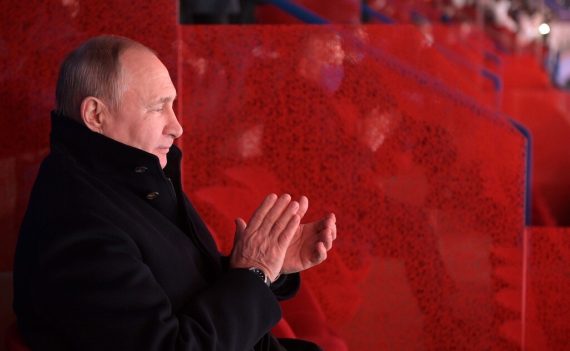As a violation of international law that reneges on its commitment to respect Ukraine’s sovereignty under Article 1 of the Budapest Memorandum on Security Assurances, Russia’s February 2022 invasion is a test case that the Chinese Communist Party (CCP) in the People’s Republic of China (PRC) is watching closely to assess U.S. resolve. U.S. credibility has been battered in recent years, most notably with the debacle in Afghanistan. Beijing and Moscow believe that further weakening of the U.S.-led order is a geostrategic opportunity to seek world dominance.
The parallels between Ukraine and Taiwan are striking – both have aligned themselves with democracy, even as both countries face powerful autocratic neighbors. Ukraine and Russia, both demographically Slavic nations, have taken different political directions. Since the breakup of the USSR, Ukraine has moved to align its political identity with the democratic transatlantic community. The 2005 Orange Revolution resulted in the downfall of the pro-Russian President Viktor Yanukovych, who was subsequently impeached after the 2013 Euromaiden Protests that saw Ukrainians seeking alignment with the EU.
The notion of Ukrainian consolidation of its fledgling democracy is anathema to Russian President Vladimir Putin, who is aware that domestic discontent against his regime needs only a neighboring democratic spark to gain momentum for public dissent. It is unsurprising that Putin’s 21 February 2022 speech sought to delegitimize the Ukrainian Government’s democratic credentials and its sovereignty.
Taiwan occupies a status broadly similar to Ukraine. Having broken away from mainland rule in 1949, Taiwan’s democratic transition stands in contrast to the mainland’s authoritarianism. Taiwan illustrates that an ethnic Chinese population is capable of being a mature democracy and a digitally-savvy economic powerhouse.
Whilst the mainland’s attempts to cover up the initial outbreak of the COVID19 pandemic in 2019 led to its worldwide spread, Taiwan has been lauded worldwide for its public health policy response based on trust and transparency between the government and its people.
Taiwan and Ukraine have notable commonality, namely the ambiguity of the international community’s obligations to the sovereignty and security of the two countries.
There is a further notable commonality between the two countries, namely the ambiguity of the international community’s obligations to the sovereignty and security of Ukraine and Taiwan. Ukraine dismantled the nuclear weapons that it inherited from the USSR’s breakup, and participated in NATO-led operations in the Balkans, Afghanistan, Iraq and the Indian Ocean.
Ukraine’s reward for these contributions did not go beyond receiving a NATO Membership Action Plan (MAP) that fell short of any NATO security commitment. For Taiwan, the closest thing to a foreign commitment to its security falls under Washington’s 1979 Taiwan Relations Act (TRA).
The latter has overseen a U.S. policy of ‘strategic ambiguity’ insofar as Washington’s security obligations to Taiwan are concerned – whilst the U.S. supplies armaments, and hints at intervention in the event of a mainland attack, the TRA eschews any official U.S. obligation to militarily defend the island.
Such ambiguities play to the advantage of Russia and China, which have sought to sow discord between the U.S. and its partners as part of a strategy of ‘divide and conquer’.
China and Russia have increasingly embraced a range of hybrid warfare strategies, with resulting diplomatic and security implications for the U.S., its allies, and numerous countries in Europe and Asia that, although faced with the threat of Russian and Chinese expansionism, do not enjoy the full-fledged security guarantees offered by the U.S. and its alliance partners.
To understand the nature of hybrid warfare tactics, it is necessary to move away from the state-centric paradigm of security that has focused on such quantifiable indices of power such as tanks and troops, and to appreciate that hybrid warfare is based on throwing the defender off balance through a unconventional means that, although falling short of direct military action, is a definitively hostile action seeking geopolitical objectives.
The repertoire of hybrid warfare instruments includes espionage, financially-based influence operations and misinformation, enabling the perpetrator to begin their activation in peacetime as part of a low-visibility, pre-conflict phase of operations, during which the perpetrator can undermine its target from within. Russia’s donation of financial contributions to the British Conservative Party and its injection of misinformation to fuel the Brexit vote in 2016 has resulted in the British Government’s indecisive, ill-prepared response to the Russian invasion of Ukraine.
Russian injection of disinformation during the U.S. 2016 elections skewed the result in favor of Trump, thus polarizing U.S. society. China, too, has embraced hybrid warfare operations. Beijing has utilized its Confucius Institutes to promote the notion that China is a peaceful power, mobilized the United Front Work Department (UFWD) to encourage the Chinese diaspora to identify politically with the PRC and participate in espionage operations, and financed corrupt diplomats and foreign politicians to promote pro-Beijing policies.
Faced with such threats, the greatest concerns should be felt not by the nuclear powers and their treaty allies, but rather the various countries to whom the international community’s diplomatic and security obligations are rather more ambiguous. Such ambiguity can be exploited by Russia and China – after all (from the Russian government’s perspective), if Ukraine is not a member of NATO, what business does NATO have in extending its nuclear umbrella to Ukraine during a Russian ‘peacekeeping operation’ in a Russian ‘sphere of influence’?
Likewise, China can exploit Taiwan’s lack of international diplomatic recognition to block any attempt by the international community to meddle in the mainland’s supposed ‘sovereignty and territorial integrity’. Tellingly, the U.S.’s posture towards Taiwan is increasingly moving away from the past policy of ‘strategy ambiguity’ towards one of ‘strategic clarity’ in underscoring Washington’s will to defend the island.
Furthermore, given the expansionist behavior of China and Russia, other European and Asian countries should heed the implications of the current crisis – particularly those in the vicinity of China and Russia, have strained relations with these powers, and do not have the protection of a nuclear-armed ally. Finland, Moldova and Vietnam spring to mind.
Recommended
Finland seceded from the Russian Empire in 1917 but was invaded by the USSR in 1939. Present-day Helsinki is an EU member, but not in NATO – even as Finland remains on Russia’s borders. Moldova, a former Soviet Republic that has aligned itself with the EU, should also be wary. The Transnistria region, a breakaway region in northeastern Moldova that borders Ukraine, has a sizeable ethnic Russian demographic, a situation analogous to the Russian communities in eastern Ukraine over whom Russia initiated its separatist insurgency in 2014.
Moldova is not a NATO member, and thus cannot expect NATO intervention in Putin’s ambitions reach Moldova
Yet, having constitutionally committed itself to neutrality, Moldova is not a NATO member, and thus cannot expect NATO intervention in Putin’s ambitions reach Moldova. Vietnam, too, has reasons to be concerned, as it has no nuclear-armed allies and no nuclear arsenal. Given its formidable land warfare reputation, Vietnam is unlikely to face a land invasion by China; rather, the latter is more likely to exploit its overwhelming air-naval superiority and its Maritime Militia to continue encroaching on Vietnamese waters, possibly to the extent of seizing islands that are indisputably part of Vietnam’s territory, but which might be retroactively claimed by Beijing under the guise of ‘historical maps’ of ‘traditional Chinese territories’, from which China may be prepared to present Hanoi with the fait accompli of Beijing’s nuclear arsenal.
Such states should ensure the de facto status of alliances with nuclear powers, before they release de jure statements seeking formal alliance membership. The security postures of Sweden and Singapore are notable in this regard. Sweden is not a member of NATO, but has a quasi-alliance relationship, as reflected in its high level of security cooperation with the alliance. Likewise, Singapore does not have an alliance relationship with the U.S. (but is allied to nuclear-armed Britain under the Five Power Defense Arrangement). Singapore does, however, have a high level of security cooperation and joint military exercises with the U.S.
The quasi-alliance relations that Sweden and Singapore have with nuclear powers highlight their ability to upgrade their existing partnerships with Washington to a fully-fledged alliance at short notice, should they feel the need to do so in the face of an overwhelming threat to their security. Had Ukraine done likewise before seeking official NATO membership, it is conceivable that it would have been able to formally join NATO, after having already assured itself of an extended nuclear umbrella to deter the type of aggression currently being undertaken by Russia.





